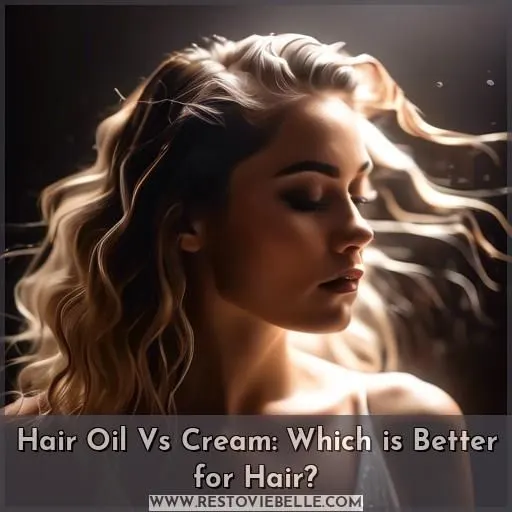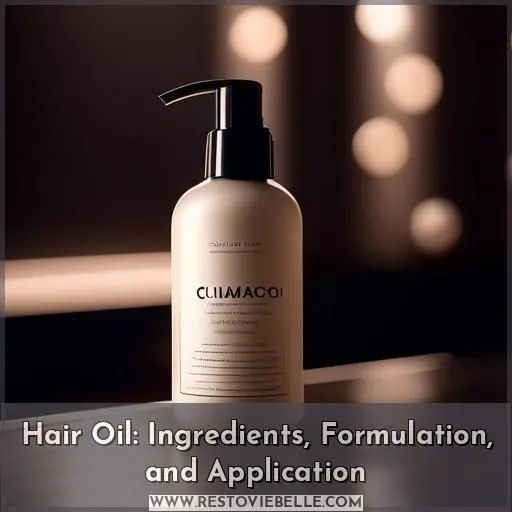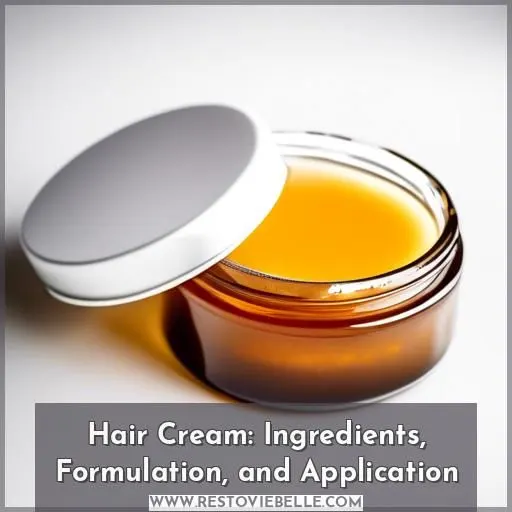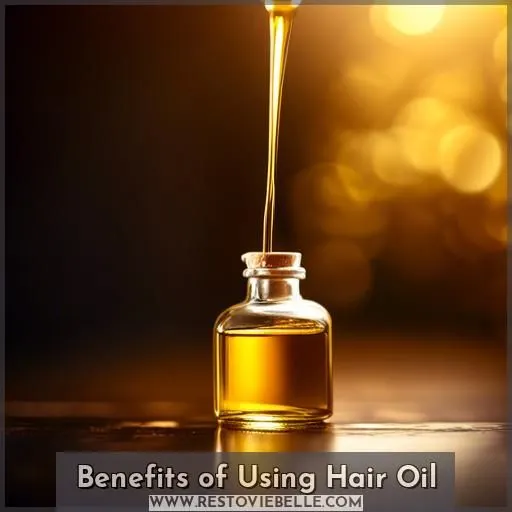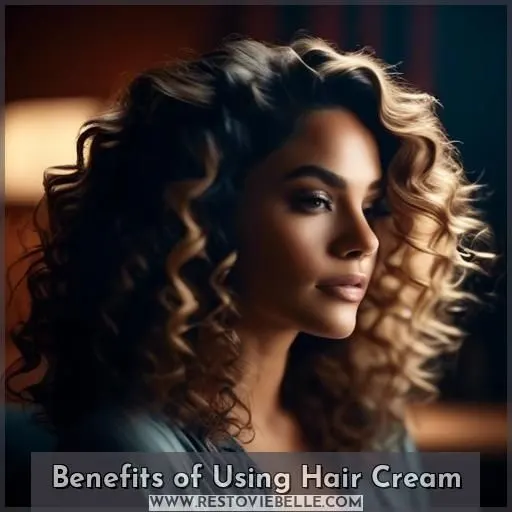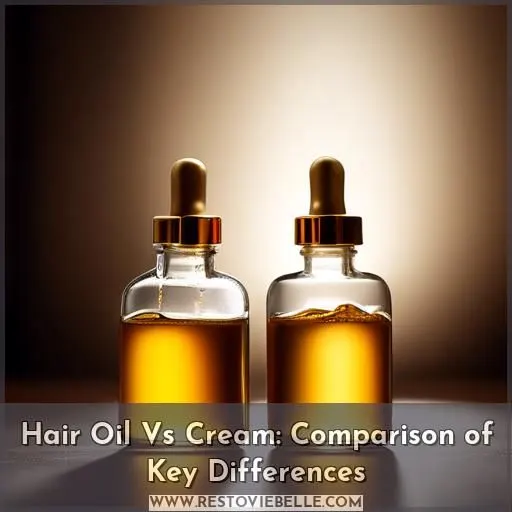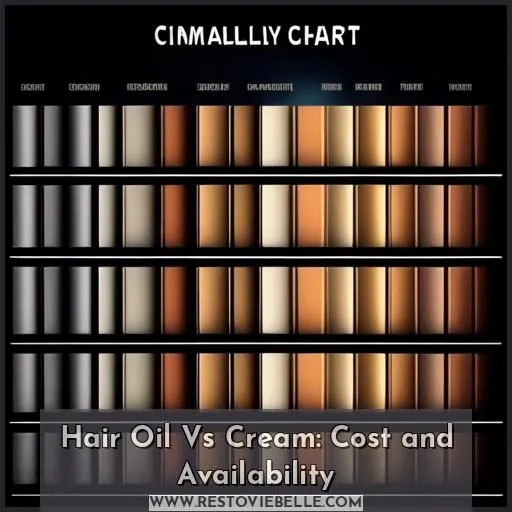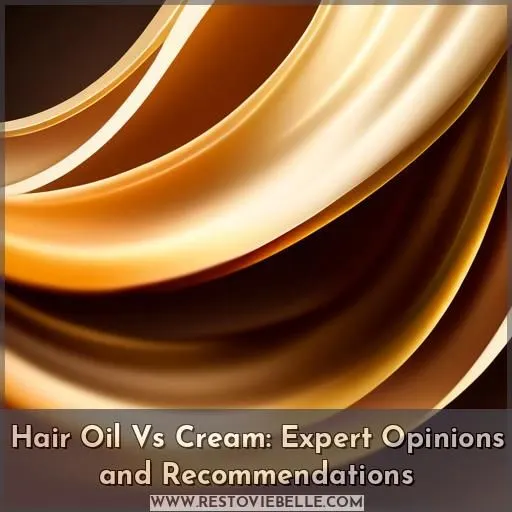This site is supported by our readers. We may earn a commission, at no cost to you, if you purchase through links.
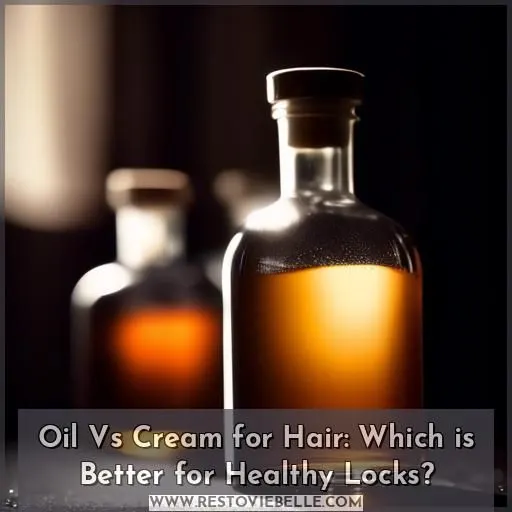
Regarding hair oil and cream, you’ll want to consider your hair type and needs.
Hair oil, made up of natural oils like coconut and argan, restores and hydrates dry, damaged hair. It nourishes the scalp, promotes growth, and prevents breakage.
In contrast, hair cream comprises emollients and conditioning agents that moisturize and protect hair in humid conditions. Creams provide versatility for styling and control frizz.
While oil is more suitable for dry hair, cream is more adaptable for diverse hair types. To harness the full potential of these products, you’ll need to understand their distinct formulations and benefits.
Table Of Contents
- Key Takeaways
- Hair Oil Vs Cream: Which is Better for Hair?
- Hair Oil: Ingredients, Formulation, and Application
- Hair Cream: Ingredients, Formulation, and Application
- Benefits of Using Hair Oil
- Benefits of Using Hair Cream
- Hair Oil Vs Cream: Comparison of Key Differences
- Hair Oil Vs Cream: Cost and Availability
- Hair Oil Vs Cream: Expert Opinions and Recommendations
- Frequently Asked Questions (FAQs)
- Conclusion
Key Takeaways
- Hair oil and cream serve different purposes in hair care, with oil being more suitable for dry, damaged hair and cream for humid conditions and styling.
- Hair oil is formulated with natural oils like coconut and argan, while creams contain emollients and conditioning agents.
- Customized combinations of oils and creams can yield remarkable results for compromised hair.
- Weather and season can affect the choice between oil and cream, with dry or damaged hair benefiting more from oil, and cream being more appropriate for humid conditions or for styling purposes.
Hair Oil Vs Cream: Which is Better for Hair?
With respect to hair care, the enduring debate between oil and cream persists. Both offer distinct advantages, addressing varied hair types and requirements.
Natural oils rejuvenate the scalp and preserve moisture, while creams offer gentle hydration. For compromised hair, a customized amalgamation of oils and creams can yield remarkable results.
Explore different product combinations to discover the ideal solution. Whether you favor the sumptuous sensation of a decadent cream or the versatility of natural oils, the well-being of your hair remains the paramount objective.
Hair Oil: Ingredients, Formulation, and Application
Hair oil is a popular hair care product that can be applied to wet or dry hair. It’s formulated with natural oils like coconut, argan, and sweet almond, which nourish and moisturize the hair, preventing split ends and breakage.
Hair oil can be applied to the scalp to improve blood circulation and promote scalp health. To apply hair oil, you can use the LOC method, which involves applying oil, leave-in conditioner, and then gel to wet hair.
Hair oil can add shine and manageability to the hair, and it’s suitable for all hair types. Alternatives to hair oil include leave-in conditioners and serums, but the choice depends on your hair type and style.
Remember to change your hair care products according to the weather and season to maintain healthy locks.
Hair Cream: Ingredients, Formulation, and Application
Hair cream is another popular hair care product that offers a range of benefits for your locks. Here’s what you need to know about hair cream:
- Hair cream benefits: Hair cream can provide hydration, protect from environmental factors, and offer flexibility in styling.
- Cream application techniques: Apply hair cream to wet or dry hair, depending on the product and your styling needs.
- Cream vs. leave-in conditioner: Hair cream is generally applied to the ends of your hair, while leave-in conditioner is left in your hair after washing.
- Cream for different hair types: Choose a hair cream that suits your hair type, whether it’s fine, thick, curly, or straight.
- Cream for specific styling needs: Some hair creams are designed for specific styling needs, such as volume, shine, or hold.
- Ingredients, formulation, and application: Hair creams typically contain water, emollients, and conditioning agents. They can be applied to damp or dry hair, depending on the product and your styling needs.
Benefits of Using Hair Oil
Are you wondering about the benefits of using hair oil? Hair oils can nourish and strengthen your tresses, while offering alternatives and considerations for different weather and seasons. Let’s explore the advantages of incorporating hair oil into your hair care routine.
Benefits of Hair Oil
Hair oiling is a popular practice in hair care routines, offering numerous benefits for hair health. Here are some key advantages of using hair oil:
- Reduces Frizz: Hair oils coat hair strands and seal in the cuticle, helping to lock in moisture and prevent frizz.
- Adds Shine: By coating the hair, oils can enhance shine and give your hair a healthy, radiant appearance.
- Nourishes Scalp: Certain oils, especially those formulated for the scalp, can be very nourishing, reducing dryness, itchiness, and flakiness.
- Promotes Hair Growth: While hair oils may not directly stimulate hair growth, they create healthier scalp conditions, which in turn promotes hair growth.
- Prevents Breakage: The vitamins and minerals found in many natural hair oils strengthen the hair follicle, preventing breakage and reducing split ends.
- Protects from Sun and Heat: Some hair oils can provide protective benefits against environmental factors, such as sun damage and heat styling.
To maximize the benefits of hair oil, it’s essential to apply it correctly. Experts recommend applying oil as a mask before washing, concentrating on the scalp and working in one-inch sections. Let it sit for about three hours before shampooing, or for a shorter period if time is limited. Regular use of hair oil can help maintain healthy, shiny, and well-nourished hair.
Alternatives to Hair Oil
If you’re looking for alternatives to hair oil, there are several options to explore. One popular choice is leave-in conditioner, which can provide moisture and detangle hair without weighing it down.
Another option is eco styler gel, which comes in various forms such as argan oil, olive oil, and krystal. These gels can offer hold and definition for diverse hair types, with argan oil being softer and most suitable for Type 2 and 3 hair, olive oil providing a versatile hold for most hair types, and krystal providing a very strong hold for edges and puffs.
Hair cream is another alternative, offering flexibility in styling and safeguarding against environmental factors.
Weather and Season Considerations
Regarding hair care, weather and season can profoundly affect the well-being and appeal of your hair. To safeguard your hair from harm and preserve its moisture, it’s imperative to contemplate environmental factors and modify your hair care regimen suitably.
During the summer, sunlight’s UV rays can inflict damage to your hair, resulting in dryness, brittleness, and a dull appearance. To counteract this, you can employ a leave-in conditioner imbued with UV protection or don a hat or headscarf to shelter your hair from the sun’s rays. Furthermore, chlorine and saltwater can rob your hair of its natural oils, causing dryness and breakage. To prevent this, saturate your hair with conditioner before swimming and afterward, rinse it with fresh water to eliminate residue.
In colder months, your hair may become dry and prone to static due to low humidity. To combat this, utilize a humidifier within your home or apply a lightweight oil to your hair to entrap moisture.
Regarding product availability, home-crafted hair oils can be a superb option for tailoring your hair care routine to the prevailing weather and season. You can opt for oils that evaporate swiftly, such as jojoba or argan oil, to deter stickiness in humid weather. Conversely, you can employ heavier oils like olive or castor oil during the winter months to provide additional hydration.
Benefits of Using Hair Cream
If you’re looking to keep your hair moisturized and hydrated, a hair cream may be the way to go. Creams can also offer flexibility in styling and help protect your locks from environmental factors like sun, wind, and humidity.
Moisturization and Hydration
To keep your hair moisturized and hydrated, consider using hair cream. Hair cream is a leave-in product that provides ongoing nourishment, hydration, and protection to your hair. It can help manage frizz, add volume to thin hair, and provide intense moisture to dry hair. Hair creams can also be beneficial for those with oily hair, as they can help regulate oil production and leave the hair refreshed.
When using hair cream, it’s imperative to apply it correctly to maximize its benefits. Apply the cream to damp hair after washing, focusing on the ends and avoiding the roots to prevent greasiness. You can also use hair cream as a leave-in conditioner, applying it before styling to help manage frizz and enhance the appearance of your hair.
Hair creams are available in various formulations and can be found in different textures, such as lotions, creams, and sprays. Some popular hair cream options include Moroccanoil Hydrating Styling Cream, Brylcreem 3-in-1 Original High Shine Men’s Hair Cream, and TIGI Bed Head After Party Smoothing Cream.
In addition to using hair cream, maintaining a balanced hair care routine is key for overall hair health. Regularly use shampoo and conditioners suited to your hair type, and consider incorporating a weekly clarifying shampoo to remove product build-up. Hair masks and protein treatments can also be used as needed to provide additional hydration and nourishment to your hair.
Flexibility in Styling
Hair cream offers flexibility in styling, providing weightless volume, enhanced definition, frizz control, and thermal protection. It’s a lightweight alternative to heavy oils and can be used for various styles, including wash & gos, edges, puffs, coils, and curls. Creams are ideal for managing hair porosity, ensuring even product absorption and eliminating breakage during styling.
Protection Against Environmental Factors
Hair cream offers protection against environmental factors, including pollution, UV rays, humidity, and heat damage. Here’s how:
- Pollution protection: Creams often contain antioxidants that shield hair from pollutants.
- UV protection: Some creams include sunscreen to guard against UV damage.
- Humidity defense: Creams can help keep hair moisturized, reducing the impact of humidity on curls.
- Heat damage prevention: Heat protectants are a common ingredient in creams, preventing damage from styling tools.
Hair Oil Vs Cream: Comparison of Key Differences
Now that we’ve examined the advantages of employing hair cream, let’s delve into the fundamental disparities between hair oil and cream. Hair oil is generally crafted from natural oils** like coconut, argan, or sweet almond, and it replenishes and hydrates hair, preventing split ends and breakage.
Conversely, hair cream is formulated with proteins and botanical extracts, providing moisture and safeguarding hair from thermal damage.
Climatic conditions and seasonality can also influence which product is most suitable for your hair, as dry or compromised hair may benefit more from hair oil, while cream can be a more appropriate choice for humid conditions or for styling purposes.
Hair Oil Vs Cream: Cost and Availability
Regarding hair care, there are numerous choices available, such as hair oil and hair cream. Both products offer distinct advantages and cater to various hair types and requirements. However, their cost and accessibility may differ, which are crucial factors to contemplate.
Here are four essential points to contemplate when determining between hair oil and hair cream:
- Hair Porosity: Different hair types possess varying levels of porosity, influencing their ability to absorb and retain moisture. Certain hair types may reap greater benefits from hair oil, while others may favor hair cream.
- Hair Thickness: Hair thickness can also impact the choice between hair oil and hair cream. Thicker hair may necessitate more product, potentially affecting the cost and availability of the selected product.
- Budget Restrictions: Hair oil and hair cream can vary in price depending on the brand and components. It’s imperative to consider your budget when making a decision.
- Product Availability: Based on your location, some hair products may be more readily available than others. Investigating local stores and online retailers can assist you in locating the optimal hair oil or hair cream to meet your needs.
Hair Oil Vs Cream: Expert Opinions and Recommendations
Regarding the selection between hair oil and cream, it hinges upon your hair porosity, styling preferences, and texture considerations. Hair oil is excellent for nourishing and moisturizing your hair, while hair cream provides flexibility in styling and safeguards against environmental factors.
Argan oil gel, for instance, is ideal for Type 2 and 3 hair, offering a gentler hold and defining curls. Conversely, Krystal gel is perfect for edges due to its extreme hold.
To maximize the efficacy of your hair products, consider employing the LOC method, which entails applying oil, leave-in conditioner, and then gel to damp hair. This method enhances shine and mitigates flakes.
Ultimately, the choice between hair oil and cream is contingent upon the requirements of your hair and your personal styling preferences.
Frequently Asked Questions (FAQs)
Can hair oil be used on dry hair?
As you traverse the hair care cosmos, oil’s lustrous allure beckons, soothing dry tresses with its nourishing embrace. Yet, like a siren’s song, caution guides: moderation is key, lest the sleek strands become an oily reverie.
How often should I use hair cream?
You should use hair cream as needed, typically every few days or when your hair feels dry or lacks moisture and manageability. Don’t overdo it, though – too much cream can weigh down your locks.
Is hair oil suitable for all hair types?
Hair oils aren’t universally suitable. Fine, thin hair may get weighed down. But you can still use lightweight oils sparingly. Thick, coarse hair loves rich oils. Always do a quick strand test on new products to assess compatibility with your unique hair type.
Can I use hair oil and cream together?
Absolutely, you can combine hair oil and cream. It’s like giving your hair a comforting hug – the oil nourishes and seals in moisture while the cream provides luscious hydration. Together, they create a powerhouse duo for soft, healthy, and beautifully glossy locks.
How long does it take for hair cream to dry?
Hair cream typically dries within 5-10 minutes after application. But you’ll want to give it ample drying time – around 15-20 minutes – to avoid that dreaded crunch or crispiness that can happen when styling too soon.
Conclusion
At the end of the day, whether you opt for hair oil or cream depends on your hair’s unique needs and the circumstances. When the chips are down, oil vs cream for hair is a matter of understanding your hair type, climate, and desired style. Striking the right balance between nourishment and manageability is key to achieving healthy, lustrous locks.
